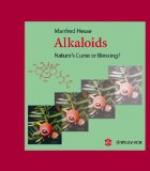|
This section contains 229 words (approx. 1 page at 300 words per page) |
Alkaloids are nitrogen-containing biochemicals, most of which are natural substances extracted from certain species of plants. The word "alkaloid" is derived from: "like an alkali" (or "base") ( when first discovered by chemists, these botanical chemicals were referred to as "vegetable alkalis." Alkaloids are usually extracted from plants using an alcohol solvent, such as ethanol. Alkaloids vary greatly in their chemical complexity and reactivity, and some show great physiological activity when ingested by animals.
One familiar example of an alkaloid is nicotine, obtained from tobacco (Nicotiana tabacum), a herbaceous plant in the nightshade family (Solanaceae). In small doses, such as those obtained by smoking tobacco in cigarettes, nicotine is a highly addictive stimulant of the nervous system. In higher doses nicotine can be extremely toxic, and in the form of nicotine sulfate it is used as an insecticide.
Other alkaloids are used as medicines or as highly addictive, recreational drugs. These include codeine, heroin, morphine, and opium, addictive narcotics derived or manufactured from the sap of the opium poppy ( Papaver somniferum). Cocaine is another natural alkaloid, derived from the foliage of coca shrubs (Erythroxylon coca and related species), and used as a stimulant and local anaesthetic. The alkaloids atropine and scopolamine are drugs derived from the belladonna plant (Atropa belladonna). A final example is quinine, a bitter-tasting, anti-malarial alkaloid extracted from cinchona trees (Cinchona ledgeriana and related species).
|
This section contains 229 words (approx. 1 page at 300 words per page) |


